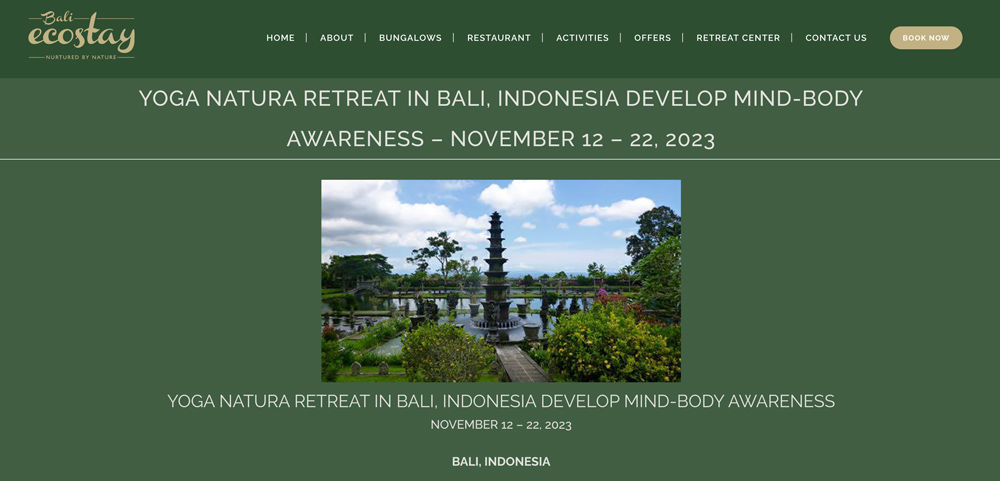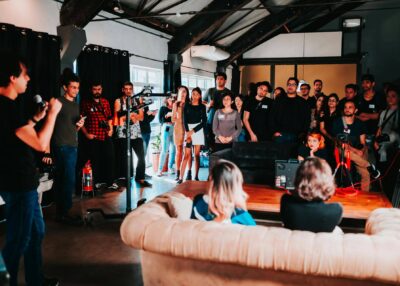4 Proven Tactics for Increasing Event Attendee Retention
Have you ever wondered why some annual events see guests returning year after year, while others see their audiences dwindling? That’s mostly down to their strategies for attendee retention. This critical event KPI measures how many current event attendees have been to your gatherings before. You want that number high. It tells you how many loyal attendees you have.
But how do you boost event attendee retention in the first place?
In this article, we're diving into four proven tactics you can use to transform the casual attendee into a committed advocate.
Follow these tips and you’ll increase your event attendee retention:
1. Deliver Exceptional Value During Events
You need to make your event memorable if you want to boost attendee retention. When people talk about your event even after it’s done, the next time you organize another, they’ll likely attend.
But what makes an event memorable in the first place? Answer: the exceptional value it provides. You need to go beyond the expected and deliver immersive attendee experiences.
Take, for instance, a wellness retreat. Attendees come expecting yoga sessions and health talks, but what if you elevate their experience? In general, a staggering 80% of event attendees want to learn. So, why not incorporate workshops on sustainable living into your wellness sessions?
You can also base your event experiences on specific attendee preferences to deliver exceptional value. Imagine this: You're organizing a major tech conference. Before the event, you dive into your customer data and notice a trend—a significant portion of your attendees are first-timers in the use of AI. What do you do?You tailor a series of interactive sessions on the side specifically for them—perhaps a 'Meet the AI Experts' session. Suddenly, these attendees aren't just attendees but active participants in an unforgettable experience crafted just for them.
Social media can help you get this critical attendee information you can use to offer value. You can run pre-event polls asking them what they’d like to see in the actual gathering. Another option is to monitor social media conversations days, even months before. For this, you can use social listening tools.
The key is to ensure the actual event you organize is a life-changer for attendees. When they see the exceptional benefits it provides, they’ll look forward to the next one. Of course, it follows that you should continue to provide the same value if not more in that next event.
2. Foster Meaningful Brand Connections with Attendees Post-Event
If you want increased audience retention, you shouldn’t just focus on giving attendees value during previous events. You need to foster meaningful and stronger connections with your attendees even after these gatherings.
- Email marketing campaigns can help you here. But sending generic emails isn’t enough. Personalized communication is crucial. You need to engage with your previous attendees in a way that makes them feel special. So, instead of a generic 'thank you for attending', include their specific names in your email copy. Also, tailor your email content to their specific event experience.
But how do you create these personalized communications? This is where technology comes in.
- The importance of CRM software, for instance, can’t be denied. It serves as a central hub for attendee information and data on customer interactions with your brand. This is information you can pull to create segmented email lists. Email marketing platforms can also help you segment your subscriber list based on your set criteria.
So, when you leverage any of these technologies, you can have, for example, a segment of your regular attendees, another of your first-time attendees, and another of those who were unable to attend.
For the first segment, then, you’d create email messages like the one above. For the second, you might craft emails giving them a sneak peek into what they can expect in the next event. For the third segment, an email with recordings of your recently-concluded event will do.
When you tailor your post-event communications to your audience’s experiences this way, you ensure that each message resonates with recipients. These small, personalized touches will make them feel valued and connected with you even long after the event has concluded.
The result? They’ll be there when you organize your next gathering.
3. Offer Special Incentives for Returning
Why do people become 'regulars' at their favorite places? It's the perks those places provide. With perks, you can also boost your event attendee retention rate.
Say, you're an event organizer who just hosted a marketing conference. To get these attendees to your next one, why not offer early-bird discounts on tickets to that upcoming event? Or, give them, as early as now, access to an exclusive session with their chosen keynote speakers or to workshop registrations. You could even introduce a loyalty program where attendees earn points for each brand gathering they attend. These points can then be redeemable for perks at future events.
Your incentives can be just about anything, for as long as people perceive them to be valuable.
With these incentives also creating a sense of exclusivity and belonging, your event can easily become a highlight people look forward to. What’s more, they might even share it with their friends and family on their social media platforms. You, ultimately, also boost attendance rates in your subsequent events.
4. Cultivate a Thriving Community
I’ve mentioned that enhancing your relationship with attendees even after your event is key to retention. But that shouldn’t be just your focus. Just as important is enhancing their connections with fellow attendees. After all, this is what people want. Just look at the stats. A whopping 66% of respondents to a study say one of the primary reasons they participate in online communities is to make connections with people who have similar interests.
How do you transform a group of attendees into a vibrant, engaged online community?
Simple. Leverage social media channels.
You can set up a Facebook group, like Coachella’s below. In the group, attendees can share highlights of the brand’s annual music festival and their fond memories. They can even have a say in event planning as they can throw in some suggestions on the artists to include in next year’s line-up:

Of course, the social platform you choose for your online community should be frequented by your target audience in the first place. Don’t create a Facebook group if most of your attendees use LinkedIn instead. You can ask them about their platform preferences before you create your online community.
Make sure you create community guidelines as well. You wouldn’t want a member resorting to hate speech or antagonizing everyone. In your guidelines, you can also specify your group is only for discussions on topics related to your events.
Once you’ve set up your group, don’t wait for your members to interact with each other. You can break the ice by posing questions relevant to your recently-concluded event, for example. Or post quotes by your previous speakers, so members can comment on them.
Online communities bring people closer and serve as a venue for social interactions. When people feel a sense of connection to a group, their loyalty to it skyrockets. Your live or virtual event becomes not just a date on their calendar, but a part of their identity.
|
Build Custom Marketing Reports Purplepass offers a variety of custom |
Conclusion
So there you have it, our four tactics to boost attendee retention for your upcoming events. The key message is this: don’t just organize an event for the sake of organizing it.
Always take it as a huge opportunity to offer valuable and memorable experiences. Foster your relationship with attendees and their relationships with fellow attendees post-event. You should also offer special incentives to entice them to attend your next gatherings.
The journey to increased event attendee retention requires creativity, empathy, and careful planning. Just understand that your attendees are more than just customers you transact with. They’re integral parts of your event's story.
If you do this, you’ll surely enjoy even more successful events!
 Author: Martin Gessner
Author: Martin Gessner
Martin Gessner is the Founder of Focus on Force. He has spent over 10 years working in various Salesforce roles including business analyst, project manager, consultant, and solutions architect.
Along the way, he has earned twelve certifications, published "The Salesforce Career Playbook", and helped Salesforce professionals learn more about Salesforce, develop their careers, and prepare for certifications.







